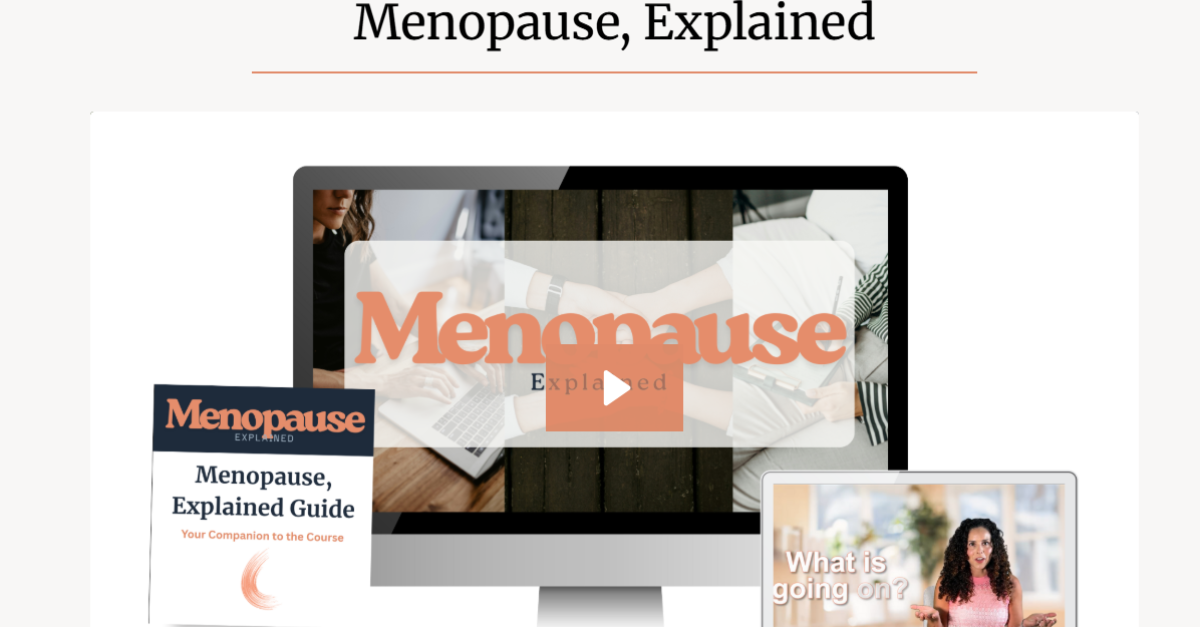When No One Says the Word: Menopause and the Unraveling of Women's Careers.
Nov 11, 2025
By Dr. Sarah Berg | OB-GYN, Menopause Specialist | Founder of Selfority
Does this sound familiar?
You’re in a meeting, halfway through a presentation you’ve rehearsed for days. Your notes are clear, your slides are sharp — and then it hits. A wave of heat so sudden it makes your vision blur. Your chest flushes, your neck prickles, your heart races. You glance down, hoping the sweat isn’t visible.
Your thoughts scatter like papers caught in wind.
You rush to finish your point, forcing a polite smile while your brain screams, please, not now. The rest of the meeting blurs, and the only thing you can remember when you walk out is shame.
Or maybe you’re standing at the register of a busy store. The line is long. Your manager is watching the clock. And you can feel that familiar, dreaded flood — your period surging again despite the super-plus tampon and backup pad you changed an hour ago. The restroom is halfway across the store, but you’re not sure you’ll make it without asking permission to leave your post. You shift your weight, praying for the line to move faster, for your body to cooperate just a little longer.
What We Don’t Name, We Misinterpret
If you’re nodding along, you’re not alone.
In fact, you’re part of a silent exodus of women whose careers are quietly derailed — not by a lack of talent or drive, but by a physiological transition no one ever taught them to expect.
According to recent data from the Fawcett Society, one in ten women in the UK have left their jobs because of menopause symptoms. Nearly half say it affected their work performance. In the U.S., research presented by the Menopause Society shows that roughly 60% of women report menopause symptoms interfere with their work, yet less than 1 in 5 feel comfortable telling a supervisor why.
And when the experience goes unnamed, the fallout gets mislabeled:
-
“Disengaged.”
-
“Forgetful.”
-
“Unfocused.”
-
“Unreliable.”
What’s actually happening is a cascade of hormonal changes impacting sleep, memory, temperature regulation, and mood — all while women juggle the height of their professional and caregiving responsibilities.
The Boardroom, the Breakroom, and Everything In Between
Menopause doesn’t discriminate by job title. It’s the quiet storm that hits CEOs and cashiers alike.
In the boardroom:
She’s running a team of fifty, but mid-presentation her mind blanks on a key number she’s known for years. The look across the table reads as “unprepared,” when in reality, her estrogen has dropped so steeply her brain’s access to short-term memory feels unreliable. She goes home questioning whether she’s lost her edge.
On the sales floor:
She’s clocking ten-hour shifts, sweat pooling under her uniform, her patience stretched thin by lack of sleep. Customers complain she’s curt. She’s written up for “attitude,” but no one knows she’s been waking every night drenched in sweat, sheets soaked, alarm set for 5:00 a.m.
In the classroom, the clinic, the office:
She’s mentoring others, leading teams, holding families together — but inside she’s running on fumes. The exhaustion, the sudden tears, the irritability… all symptoms of a transition she’s told is “natural,” but that doesn’t mean it’s easy.
The Cost of Silence

For many women, the emotional toll becomes the tipping point.
You start to wonder: Is this who I am now?
The confident, composed woman you once were feels out of reach.
Surveys show that over 25% of women consider changing jobs, reducing hours, or retiring early because of menopause symptoms. Many never make the connection until years later. They just feel like they’ve “lost their spark.”
Workplaces, meanwhile, lose seasoned talent — leaders, mentors, institutional memory — at the exact time women are hitting their professional stride. It’s not a pipeline problem. It’s an awareness problem.
If No One Talks About It, How Could You Know?
If no one says, this is menopause, how could you know this isn’t permanent?
If no one says, there are treatments and support, how could you know there’s help?
If no one normalizes it, how could you know that you’re not losing your mind — you’re just navigating a hormonal transition as real and as worthy of care as any other medical condition?
This is why awareness isn’t just about comfort. It’s about career equity.
Menopause education is leadership education.
It’s how we keep women in positions of influence — not watching from the sidelines because their bodies betrayed them in silence.
A Transition, Not an Ending
If you’ve found yourself shrinking back from opportunities or questioning your competence — pause.
It might not be burnout.
It might not be you.
It might be menopause.
And once you recognize it, you can take your power back.
Treatment exists.
Relief exists.
And perhaps most importantly, you still exist — capable, sharp, and needed.
Menopause doesn’t mark the end of your relevance. It marks the beginning of a new, informed chapter — if we’re brave enough to name it.
Because Knowledge Changes Everything
If this story sounds like yours, you’re not broken. You were just missing the map.
At Selfority, we’re rewriting this story.
My course, Menopause, Explained, was built to help women — and workplaces — understand what’s happening, why it happens, and what can be done. Because when women are supported through transition, they don’t just stay in the room.
They lead it.
👉 Learn more at Selfority.com

Do you have a webinar or free/paid event coming up soon? Mention it here so that people click through to the registration page
Stay connected with news and updates!
Join our mailing list to receive the latest news and updates from our team.
Don't worry, your information will not be shared.
We hate SPAM. We will never sell your information, for any reason.

